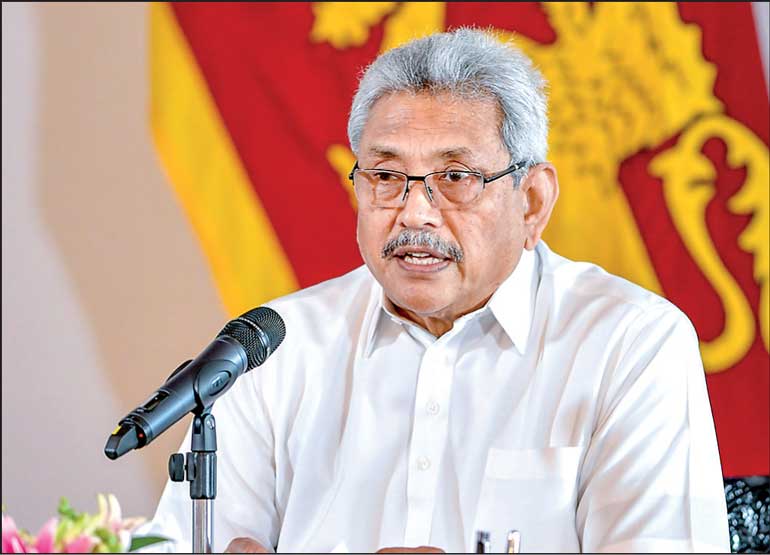Wednesday Feb 18, 2026
Wednesday Feb 18, 2026
Monday, 14 June 2021 00:00 - - {{hitsCtrl.values.hits}}

Under fire for imposing additional burden on the masses amidst the COVID-19 pandemic, President Gotabaya Rajapaksa yesterday justified the sharp hike in fuel prices, saying the move was warranted and also helps to achieve other beneficial broader socio-economic goals.
In a statement, the President said the price increase is only one key factor in a common strategy that strengthens the local economy.
“It aims to strengthen the country’s banking system, maintain low interest rates, reduce foreign exchange spending and strengthen the exchange rate. Further, it is a decision taken to safeguard the health and welfare of the people and to transform the import-dependent consumer economy into an investment and consumer economy dependent on domestic production,” the President argued.
The statement said the Cost of Living Committee, chaired by the President and convened with the participation of the Prime Minister and the ministers in charge of the subject, focused on a number of main reasons for the need to increase fuel prices.
On Saturday, the Government raised fuel prices ranging between Rs. 7 and Rs. 23 per litre. Fuel was last revised 21 months ago.
President said one of the main reasons for this is the continuous rise in global crude oil prices over the past few months. At present, the price of a barrel of crude oil is over $ 70, and market trends indicate that it will continue to rise.
President said Sri Lanka has become a country that not only spends a large amount of foreign exchange for fuel imports, but also a country where its transport services, power generation and the function of some of the factories are based on these imports.
In 2019 alone, the foreign exchange spent on oil imports was $ 3.6 billion. The cost spent for fuel imports was reduced to $ 2.3 billion in 2020 due to the ban on vehicle imports and the reduction in international oil prices to $ 45.57 in 2020 from the previous price of $ 68.80 in 2019. However, the price of a crude oil barrel in 2021 has exceeded $ 70. Therefore, although the ban on vehicle imports was maintained, the expenditure from the foreign exchange earnings for petroleum imports would be around $ 4,000 million. This amount is close to one-third of the total anticipated foreign exchange earnings from exports in 2021.
The import-dependent pattern of consumption, which includes imports of seeds, fertilisers, food, pharmaceuticals and vaccines, must be transformed into a production-based pattern of consumption.
In addition to spending foreign exchange, the Ceylon Petroleum Corporation (CPC) has been a loss-making institution, relying on loans obtained from the Bank of Ceylon and the People’s Bank annually. The amount to be paid to the two banks as loans is Rs. 652 billion. As the Ceylon Electricity Board (CEB) has also to repay nearly Rs. 85 billion in loans to the two banks, the Treasury has issued bonds on loans given by the State banks, and it has to pay higher interest on the loans as well.
Private and public transportation accounts for nearly 60% of the fuel consumption, and it should be reduced. Therefore, electric vehicles, as well as electric rail transport, have the potential to reshape the transportation sector in the country.
Transport costs can also be stabilised by completely stopping the importation of new vehicles powered with fuel as well as promoting the use of electric vehicles and providing electric engines for three-wheelers.
Transitioning towards the use of eco-friendly energy sources is imperative due to an increase in lung-related diseases in the population and increasing air pollution in urban areas caused by high fuel consumption. By converting the Kelanitissa Power Station into an LNG Power Plant, the Ceylon Electricity Board will also be able to reduce the higher costs for fuel.
According to the National Development Program towards a Climate Resilient Green Economy, fertilisers, fuels, forest resources and garbage should be managed in a manner that enhances the quality of life of the people. Therefore, in addition to increasing prices, the Government has taken steps to implement a number of proposals to change the pattern of consumption based on imported fuels.
The President said the Government also aims to improve the renewable energy capacity to prevent 30% of fuel usage by the CEB for power generation. Therefore, providing solar thermal power kits to every household, school, hospital and government building will pave the way for the public to generate income by selling those units to the CEB while the high cost borne by the people will also reduce.
